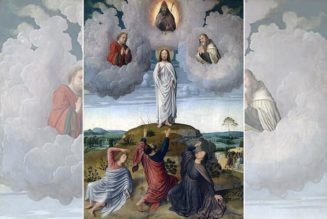By Fr. Jerry Pokorsky ( bio – articles – email ) | Aug 03, 2020
Discouragement is a form of anger, the result of chronic suffering or its prospect, real or imagined. We’re often discouraged because of deep-seated personal problems, family difficulties, political turmoil, fear of the future, and so on. We look for easy answers, but answers usually don’t come easily. Of course, the remedy for discouragement is the practice of the Catholic faith. But what are the practical measures we can take? Here are a few tips for your consideration:
Show up. Upon hearing of the death of John the Baptist, Jesus retired to a deserted place presumably to grieve for his cousin. But He didn’t allow his grief to distract Him from his duties. It fueled his compassion: He readily responded to the crowds who sought Him for healing, followed by the great miracle of the multiplication of the loaves. The same can be true for us in times of grief. Amid sorrow, we often find ourselves capable of extraordinary generosity, accomplishing duties in ways that later astound us.
Look for the good and imitate holy examples. The Academy Award-winning movie, A Man for All Seasons, depicts the life of St. Thomas More, the Chancellor of England under Henry VIII. He has a falling out with the King over Henry’s adulterous marriage. In conscience, Thomas refuses to sign the Oath of Succession, and the refusal costs him his head. The story describes More’s remarkable courage, wit, and integrity. On the other hand, it is also a story of pettiness, scheming, and ugliness. Here is the choice we all face in every season: If you want to go to heaven, regardless of consequences, don’t give up, keep punching, and choose life in Christ.
The motif of The Man for All Seasons suggests another remedy for discouragement. The movie uses images of the changing seasons—spring, summer, fall, and winter—not only to mark the passing of time but as a contrast to the ugliness of human behavior. The effect communicates the relentless beauty of God’s creation, regardless of the evil in the world, and confirms these words of Jesus: The Father indeed “makes his sun rise on the evil and the good, and sends rain on the just and on the unjust.” (Mt. 5:45)
Every generation has its ugly side, where so many attack truth, goodness, and beauty. Recently a member of Congress identified St. Damian of Molokai as an example of racism, patriarchy, and colonialism. That sort of ignorance and hatred is breathtaking and frankly discouraging—not only for us but on behalf of those deceived by such hatred, a hatred that seems without bounds.
Benign patriotic hymns such as this one used to unify us and bring us righteous pride as a nation:
O beautiful for spacious skies,
For amber waves of grain,
For purple mountain majesties
Above the fruited plain!
But these traditional tunes have become victims of ignorance and hate. The ignorance began with jests. Many people in big cities have no idea what a cornfield looks like. Corn comes from cans. Bread comes from supermarkets. Then the jokes turned toxic. Why not erase these meaningless hymns—and those who sing them—to placate the “grievances” of protesters?
No, not if we wish to retain sanity. Even with our best efforts, we cannot extinguish beauty. When Jesus multiplied the loaves, the bread not only anticipated the Eucharist, it also called to mind the amber waves of grain and the beauty of creation that magnifies the Lord. Those fields reveal the abundance of love God lavishes upon us. So in every season—especially in times of uncertainty, anguish, trial, and discouragement—we would do well to ponder God’s handiwork, his good creation, and our creation in his image and likeness.
Work the confessional. When I was in the seminary, I asked a priest why so many priests have given up hearing Confessions. His response was immediate. He suggested many priests could not bear hearing their own sins. It didn’t take me long to realize that God uses my penitents to remind me of my sins. That also can be discouraging. But it shouldn’t be.
That’s why it is profitable to have a Crucifix frequently in view. When we gaze upon that Cross, we have the opportunity to ponder what our sins have done to our good and kind Savior. In my confessional, I’ve also placed photographs I’ve taken, an amateur’s hobby. The pictures remind me of the foundations of every Sacrament: God’s good creation. The flowing streams of water, the fields of wheat, the rising and setting sun, the misty rain, God’s promise of salvation in a rainbow arcing over a river. “The heavens are telling the glory of God, and the firmament proclaims his handiwork.” (Psalm 19:1)
St. Thomas More says, “God made the angels to show Him splendor, as He made animals for innocence and plants for their simplicity. But Man He made to serve Him wittily, in the tangle of his mind.” In heavenly glory, God restores the beauty of his handiwork, including the beauty of our souls created in his image and likeness.
If you find yourself discouraged by the attack on truth, goodness, and beauty, be a cancel-culture subversive. Resolve to turn off the computer screens for extended periods. Tuck away that smartphone. Spend time with your family, appreciating the magnificence of God’s creation, the foundation of the Sacraments—above all the Blessed Eucharist—that He uses to save us.
While you’re in the anti-cancel culture mood, rent A Man for All Seasons, or watch a few old movies with the kids and rejoice when the good guys triumph over the bad guys in a fair fight.
Sound Off! CatholicCulture.org supporters weigh in.
All comments are moderated. To lighten our editing burden, only current donors are allowed to Sound Off. If you are a current donor, log in to see the comment form; otherwise please support our work, and Sound Off!


 Fr. Jerry Pokorsky is a priest of the Diocese of Arlington who has also served as a financial administrator in the Diocese of Lincoln. Trained in business and accounting, he also holds a Master of Divinity and a Master’s in moral theology. Father Pokorsky co-founded both CREDO and Adoremus, two organizations deeply engaged in authentic liturgical renewal. He writes regularly for a number of Catholic websites and magazines.
Fr. Jerry Pokorsky is a priest of the Diocese of Arlington who has also served as a financial administrator in the Diocese of Lincoln. Trained in business and accounting, he also holds a Master of Divinity and a Master’s in moral theology. Father Pokorsky co-founded both CREDO and Adoremus, two organizations deeply engaged in authentic liturgical renewal. He writes regularly for a number of Catholic websites and magazines. 




![A writer, raised by atheist parents, reflects on the brilliance of ‘A Charlie Brown Christmas’ [you may hit a paywall here, but it’s well worth reading]…](https://salvationprosperity.net/wp-content/uploads/2021/12/a-writer-raised-by-atheist-parents-reflects-on-the-brilliance-of-a-charlie-brown-christmas-you-may-hit-a-paywall-here-but-its-well-worth-reading-327x219.png)

